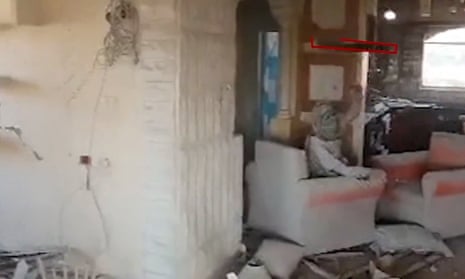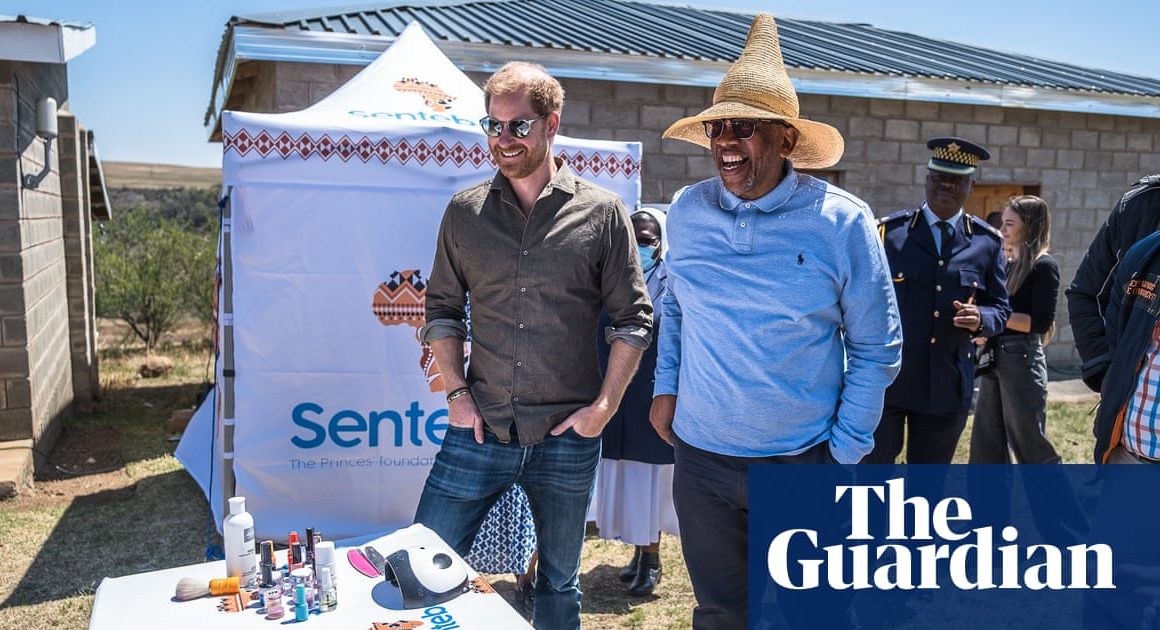Iran says manner of Sinwar’s death will strengthen ‘spirit of resistance’
Iran’s mission to the UN has said the circumstances of Yahya Sinwar’s death will strengthen the “spirit of resistance”.
Sinwar was apparently killed while fighting Israeli forces in Rafah, rather than hiding in a bunker as Israel had consistently portrayed him.

The Israeli military posted drone footage of the Hamas leader, apparently having lost part of his arm, sitting in an armchair wearing battle fatigues and a keffiyeh in a ruined apartment in Rafah. As he watches the drone, he throws an object at it.
It said in a statement posted on X, the Iranian UN mission said:
When US forces dragged a disheveled Saddam Hussein out of an underground hole, he begged them not to kill him despite being armed. Those who regarded Saddam as their model of resistance eventually collapsed.
When Muslims look up to Martyr Sinwar standing on the battlefield – in combat attire and out in the open, not in a hideout, facing the enemy – the spirit of resistance will be strengthened.
He will become a model for the youth and children who will carry forward his path toward the liberation of Palestine. As long as occupation and aggression exist, resistance will endure, for the martyr remains alive and a source of inspiration.
When U.S. forces dragged a disheveled Saddam Hussein out of an underground hole, he begged them not to kill him despite being armed. Those who regarded Saddam as their model of resistance eventually collapsed. However, when Muslims look up to Martyr Sinwar standing on the… pic.twitter.com/S1QUN47y83
— I.R.IRAN Mission to UN, NY (@Iran_UN) October 17, 2024
Key events
As the US pushes for a fresh round of diplomacy aimed at securing a ceasefire in Gaza, secretary of state Antony Blinken has been speaking to Qatari prime minister Mohammed bin Abdulrahman Al Thani, who has played a key role in negotiations.
In a statement after the phone call, the US state department said the pair had discussed “the death of Yahya Sinwar and the need to redouble efforts to end the conflict and secure the release of hostages”.
Blinken also reaffirmed US commitment to a diplomatic resolution to Israel’s invasion of Lebanon.
In September the US had backed calls for a 21-day ceasefire in Lebanon, but in the wake of the killing of the Hezbollah leader, Hassan Nasrallah, appeared to greenlight Israel’s air and ground offensive.
Israeli prime minister Benjamin Netanyahu said after news of Sinwar’s death that “We will not stop the war” in Gaza.
Harris says Sinwar death ‘an opportunity to finally end the war in Gaza’

Robert Tait
Kamala Harris has hailed the death of Yahya Sinwar as an opportunity to finally end the war in Gaza and prepare for “the day after” when Hamas no longer dominates the territory.
The US vice-president and Democratic nominee said “justice has been served” with the death of the Hamas leader, adding that the US, Israel and the wider world were “better off as a result”.
Harris also pressed for an end to the year-long hostilities that have killed more than 42,000 people in Gaza and left a trail of destruction in the territory.
“Hamas is decimated and its leadership is eliminated,” she said. “This moment gives us an opportunity to finally end the war in Gaza.” The end of the conflict had to be accompanied by security for Israel, the release of the remaining hostages and an end to suffering in Gaza, she said.
She also hinted at her support for Palestinian statehood by saying it should herald Palestinians’ rights to “dignity, security, freedom and self-determination”.
Her comments chimed with those of Joe Biden, who has been criticised by progressives for unstinting support for Israel even while Benjamin Netanyahu had ignored his entreaties to avoid civilian casualties and ease humanitarian suffering in the tiny coastal territory.
“Israel has had every right to eliminate the leadership and military structure of Hamas,” Biden said in comments that appeared designed to answer criticisms of his support.
He said Sinwar had represented an “insurmountable obstacle” to a better future for Israelis and Palestinians. “That obstacle no longer exists. But much work remains before us,” he said.
Biden said he would talk to Netanyahu and other Israeli leaders about “ending this war once and for all”.
Read the full story here:
Iran says manner of Sinwar’s death will strengthen ‘spirit of resistance’
Iran’s mission to the UN has said the circumstances of Yahya Sinwar’s death will strengthen the “spirit of resistance”.
Sinwar was apparently killed while fighting Israeli forces in Rafah, rather than hiding in a bunker as Israel had consistently portrayed him.
The Israeli military posted drone footage of the Hamas leader, apparently having lost part of his arm, sitting in an armchair wearing battle fatigues and a keffiyeh in a ruined apartment in Rafah. As he watches the drone, he throws an object at it.
It said in a statement posted on X, the Iranian UN mission said:
When US forces dragged a disheveled Saddam Hussein out of an underground hole, he begged them not to kill him despite being armed. Those who regarded Saddam as their model of resistance eventually collapsed.
When Muslims look up to Martyr Sinwar standing on the battlefield – in combat attire and out in the open, not in a hideout, facing the enemy – the spirit of resistance will be strengthened.
He will become a model for the youth and children who will carry forward his path toward the liberation of Palestine. As long as occupation and aggression exist, resistance will endure, for the martyr remains alive and a source of inspiration.
When U.S. forces dragged a disheveled Saddam Hussein out of an underground hole, he begged them not to kill him despite being armed. Those who regarded Saddam as their model of resistance eventually collapsed. However, when Muslims look up to Martyr Sinwar standing on the… pic.twitter.com/S1QUN47y83
— I.R.IRAN Mission to UN, NY (@Iran_UN) October 17, 2024
Opening summary
Hello and welcome to the Guardian’s live coverage of Israel’s wars on Gaza and Lebanon.
Iran has said that the circumstances of Yahya Sinwar’s death will strengthen the “spirit of resistance”, after the Israeli military (IDF) confirmed it had killed the Hamas leader in the southern Gaza town of Rafah.
A drone video released by the IDF appeared to show Sinwar, apparently severely injured, sitting in an armchair in a ruined apartment, wearing a keffiyeh and battle fatigues. He throws an object at the drone.
It said in a statement posted on X, Iran’s UN missions said:
When Muslims look up to Martyr Sinwar standing on the battlefield – in combat attire and out in the open, not in a hideout, facing the enemy – the spirit of resistance will be strengthened.
He will become a model for the youth and children who will carry forward his path toward the liberation of Palestine. As long as occupation and aggression exist, resistance will endure, for the martyr remains alive and a source of inspiration.
Meanwhile, the US signalled it would begin a new push for a ceasefire, with US vice president Kamala Harris stating that Sinwar’s killing was “an opportunity to finally end the war in Gaza” and that it was “time for the day after to begin”.
She echoed similar comments from President Joe Biden, who said it was “time for this war to end and bring these hostages home” as he arrived in Germany.
He added that he was “hopeful” about the prospects of a ceasefire and would be sending secretary of state Antony Blinken to Israel in the coming four to five days to discuss securing Gaza and what the “day after” the war will look like.
In Lebanon, the militant group Hezbollah said it was launching a new and escalating phase in its war against Israel, and that it had used precision-guided missiles against troops for the first time.
Hezbollah “announces a transition to a new and escalatory phase in the confrontation with the Israeli enemy, which will be reflected in the developments and events of the coming days,” the group said in a statement.
In other developments:
-
The Israel Defense Forces (IDF) said Sinwar had been “eliminated” in Tel Sultan, a neighbourhood of Gaza’s southernmost town, Rafah, on Wednesday. The bodies of three militants were taken to Israel for DNA and dental record testing. Sinwar’s death brings to an end to a year-long hunt for the mastermind of the 7 October attack on Israel that triggered the war in Gaza.
-
Israel’s Kan Radio reported that the Hamas leader had been killed “by chance”, and not as a result of intelligence gathering. Photos and video from the scene, broadcast on Israeli media, showed what appeared to be Sinwar’s body lying in a pile of rubble on the floor of a destroyed building.
-
Hundreds of people gathered in Tel Aviv to call for the release of hostages held in Gaza after the news of Sinwar’s assassination broke.
-
The UK prime minister, Keir Starmer, said his country “will not mourn” Sinwar’s death, as he called for the release of hostages, an immediate ceasefire and an increase in humanitarian aid into Gaza. The head of the European Commission, Ursula von der Leyen, said his death “is certainly weakening Hamas”. France’s president, Emmanuel Macron, said he was thinking “with emotion of the victims” of the 7 October Hamas attacks for which Sinwar was the mastermind. Germany’s foreign minister, Annalena Baerbock, called on Hamas to “immediately release all hostages and lay down its arms, the suffering of the people of Gaza must finally end”. Antonio Tajani, Italy’s foreign minister, said he hoped that that Sinwar’s killing “will lead to a ceasefire in Gaza”.
-
At least 28 people were killed in an Israeli airstrike on a school turned shelter in the Jabaliya neighbourhood of Gaza City on Thursday. Among those killed in the bombing of Abu Hussein school included doctors and several children, according to health officials, who warned the final toll was likely to be higher. The attack on the Jabaliya school also caused a fire.
-
Another 11 people were killed in two separate airstrikes in Gaza City on Thursday, as Israel’s latest campaign in Jabaliya, a district of Gaza City, reaches its second week. Jabaliya residents said on Thursday that several streets were blown up in bombings, by tank fire and controlled detonations, and that Jabaliya, together with the northern towns of Beit Hanoun and Beit Lahia, are now under a complete siege. An estimated 400,000 people are trapped by the fighting, with dwindling humanitarian supplies.
-
The entirety of northern Gaza is under Israeli evacuation orders. Among those who have remained in the north are disabled or elderly people and their families, who say it is too dangerous and difficult to move. The UN human rights chief, Volker Türk, warned Israel that any “large-scale forcible transfer” of civilians out of conflict-wracked north Gaza could constitute a war crime if not done on “imperative military grounds”.
-
Israel allowed 50 lorries carrying food, water and medical equipment to enter northern Gaza on Wednesday, following a warning from the US that Israel must allow more aid to reach Gaza or face a cut off in military support. Israel had previously not allowed any aid to enter the north since the start of the month, leading the UN World Food Programme to once again raise the alarm of imminent famine.
-
It was unclear how many Palestinians were killed in other strikes in central and southern Gaza on Thursday. At least 42,438 Palestinians have been killed and 99,246 injured since 7 October, the health ministry in Gaza said on Thursday. The toll includes 29 deaths in the previous 24 hours, according to the ministry, which said 99,246 people have been wounded in the Gaza Strip since the war began.
-
Lebanon’s crisis response unit said 45 people were killed and 179 were wounded in the past 24 hours on Thursday. The latest figures raise the total death toll over the past year of conflict between Israel and Hezbollah to 2,412 killed, according to Lebanon’s health ministry. In addition, 11,285 people have been injured.
-
Al Jazeera staff evacuated their offices in downtown Beirut on Thursday afternoon after receiving messages warning them to leave the building, similar to past evacuation warnings from Israel that preceded bombings, the network reported. Two embassies, one of which is the Norwegian embassy, is also housed in the same building were also evacuated.
-
The US carried out B-2 stealth bomber strikes on Houthi underground weapons facilities in Yemen for the first time. Local television in Houthi-run areas of the country reported 15 strikes hit five sites near the capital, Sana’a, and in the northern governorate Saada, the traditional Houthi homeland, on Thursday around dawn. The move appears in part to be a warning from Washington to Houthi’s backers in Tehran. The Houthi rebels vowed to retaliate.
-
The US announced a new “temporary protected status” allowing Lebanese nationals in the US to remain in the country and apply for work permits. The designation will last 18 months “due to ongoing armed conflict and extraordinary and temporary conditions in Lebanon that prevent nationals of Lebanon from returning in safety”, the US Department of Homeland Security (DHS) said.












